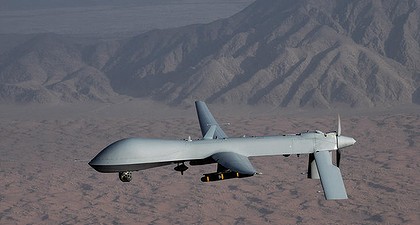Search
Democracy Links
Member's Off-site Blogs
drone wars .....

The use of unmanned aircraft belies America's rhetoric about its values.
The CIA recently launched its first drone attack of 2012. Three people in North Waziristan were killed. If you haven't yet heard of these Terminator-style US drones, it is likely you will soon. Their usage in surveillance, modern warfare and covert ''counter-terrorism'' measures is rapidly expanding.
Drones, or unmanned aerial vehicles, are the new face of the war on terror and the latest attempt by the United States to circumvent international law in pursuit of its alleged enemies. After failing to fulfil his promise to close the military prison at Guantanamo Bay, President Barack Obama spent New Year's Eve signing the National Defense Authorisation Act (NDAA). The NDAA codifies the indefinite detention, without trial, of US citizens. The third part of this trinity is the increase in a multi-agency network of drones carrying out secret extrajudicial assassinations of suspected militants. In his inauguration speech, Obama said: ''As for our common defence, we reject as false the choice between our safety and our ideals.'' Yet these policies enshrine just such a false dichotomy.
Equipped with Hellfire missiles, Predator drones operate mainly in north-west Pakistan. New America Foundation has attempted to map the strikes, which have hugely escalated under Obama's presidency. Between 2004 and 2011, the foundation conservatively estimates 1717 deaths have resulted from drone strikes in Pakistan. It also estimates a 32 per cent civilian death rate.
New York Times reporter David Rohde, who was kidnapped and held in Pakistan for seven months, referred to the drones as a ''terrifying presence''. Pashtun tribal elders have also spoken of the ongoing drone presence and living with the constant fear of death.
At a meeting held in Waziristan, organised by the UK legal charity Reprieve, locals were encouraged to accumulate photographic evidence of the damage these strikes cause. Tariq Aziz, a 16-year-old boy, offered to collect this information if it would help protect his family. Within 72 hours the car he was travelling in was blown up by a drone.
American officials have reportedly praised the precision of the drone attacks. According to The Guardian, ''the CIA does not comment on drones, but privately claims civilian casualties are rare''. Was Tariq Aziz a militant? Was his 12-year-old cousin - also killed - a militant? Was he involved in plotting attacks that may have jeopardised American lives? Here is the problem: amid official secrecy and in the absence of an allegation tried, tested and proven or disproven in an independent and transparent court, we can only guess. If Guantanamo and the NDAA represent an assault on the right to due process, drones dispense with the principle entirely.
The situation in Waziristan is further compounded by the absence of journalists who can refute claims that innocent people are killed or independently investigate them.
The targets of drones are not only ''unpeople'' - people whose rights and lives are deemed expendable in the pursuit of foreign policy objectives. In September 2011, US citizen and radical cleric Anwar al-Awlaki was extrajudicially assassinated in a US drone strike in Yemen. Two weeks later, his 16-year-old son was also killed in a drone strike. That the US government is practising a policy of death penalty without trial for US citizens should be alarming for both progressives and conservatives.
Howard Koh, the State Department's top legal adviser, has stated drone strikes ''comply with all applicable law, including the laws of war''. But one can argue anything is legal if a ''self-defence'' or ''for security reasons'' is placed in front of it. That doesn't necessarily make it just, right or wise.
Drone strikes rely on fallible intelligence from local informants, which leads to errors. The price is innocent people's lives. It also sets a dangerous international precedent - that the secret extrajudicial execution by one country, to kill people in another country, with minimal oversight and no judicial process, is acceptable. This is the policy being carried out by drones.
At a very basic level, it is difficult to gauge whether the policy actually works. Supporters claim the policy has successfully disrupted terrorist networks. Yet suicide attacks in Pakistan and violence in Afghanistan and Iraq have often intensified following the drone deaths of senior al-Qaeda and Taliban operatives.
According to various sources, Taliban leader Hakimullah Mehsud has been killed multiple times, exposing both the imprecise nature of the policy and the prevalence of misinformation.
Drone strikes also fuel anti-American sentiment. Waziristan native Noor Behram has stated that typically after a drone strike the view is: ''America is killing us inside our own country, inside our own homes, and only because we are Muslims ... hatred builds up.'' As such, it is no surprise that the former director of US National Intelligence, Dennis Blair, has criticised the policy, saying: ''Drone strikes are no longer the most effective strategy for eliminating al-Qaeda's ability to attack us.''
But any debate regarding merits, costs and legitimacy is obscured by the secrecy within which it is conducted. In the absence of information, the people in whose names these actions are committed are denied the opportunity to make an informed judgment. But perhaps that is the point.
- By John Richardson at 24 Jan 2012 - 8:27am
- John Richardson's blog
- Login or register to post comments
Recent comments
44 min 15 sec ago
1 hour 26 min ago
2 hours 25 min ago
4 hours 33 min ago
6 hours 43 sec ago
20 hours 17 min ago
20 hours 15 min ago
21 hours 17 min ago
1 day 1 hour ago
1 day 5 hours ago